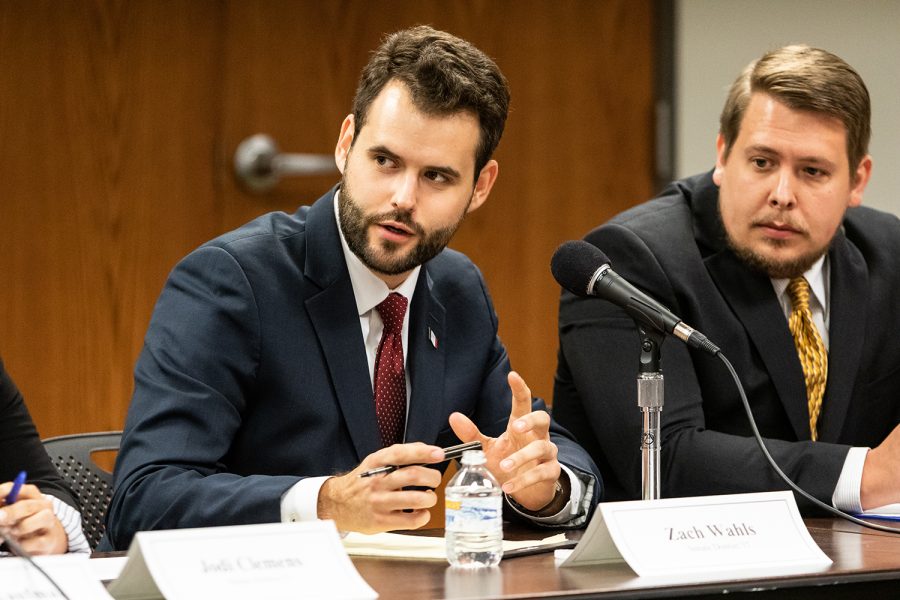Jaimes: Bipartisan popularity can be achieved through better rhetoric
A candidate forum at the Coralville Public Library can have some constituents concerned about their candidates’ ability to work across party lines and make progress in Des Moines.
Zack Wahls, the Democratic candidate for Iowa State Senate District 37, participates in a public forum at the Coralville Public Library on Monday, Sept. 10, 2018.
September 18, 2018
There has been a strong flirtation between Democrats and the idea of statism since the 2016 election. The concept of returning power to states’ hands has felt justifiable by Iowa Democrats since the privatization of Medicaid — a unilateral decision made by the then-governor in an attempt to avoid bankrupting the state.
While it was pushed too fast and without consent of the Legislature, Democrats have used it as an example of how their ideal state would look … with the government holding all of the power.
RELATED: Candidates for Iowa Legislature talk privatization, worker rights, education
On Sept. 10, a candidate forum at the Coralville Public Library showcased six candidates running for the state Legislature. The party affiliations present consisted of four Democrats, one Libertarian, and one Republican. From discussing Medicaid to starting businesses in Iowa, Democrats dominated the entirety of conversations with only one solution: money.
Of course, their opposition to the Republican-led tax cuts is to be expected, but the Democrats’ rhetoric enters a dangerous area of a powerful central government often forgetting about the “little man” that they were supposedly fighting for.
It was disturbing to hear the word choice used. Many of the candidates come across as if they are being denied what they are owed from the taxpayers.
By sitting on a panel of all like-minded candidates, it is easy to forget that not everyone in the audience is going to agree with the policies being promoted. A breakdown of the rhetoric used may shed light to candidates on how unappealing they can come off as.
When asked by the audience on how candidates plan to fund all of the promises they are running on, many turned to recent tax cuts, which take effect in 2019, and rescinding tax breaks to “millionaires.” One candidate highlighted that it was unfair to praise a tax cut in which 25 percent of Iowans saw no benefit. To a fiscally conservative constituent, this translates into a similar statement made by House Minority Leader Nancy Pelosi, in which she referred to Republican tax cuts as “crumbs” being given to workers. To believe that a tax cut for 75 percent of Iowans was an unnecessary gift to millionaires is out-of-touch and insulting to constituents.
Another candidate answered the same question by adding that a tax cut on the wealthy means less in social services to the middle and lower classes. Their response came off as if they wanted to increase their access to taxpayers’ wallets.
Taxpayers concerned with this statement would believe that a group of legislators in Des Moines is not more capable of handling their money better than the taxpayer themselves. To denounce the tax cut in support of social services seems as if to take money from one’s paycheck just to give it to the government in order for the government to turn around and give it back in a way it deems best.
RELATED: Rosario: New report on Iowa privatized Medicaid raises fiscal questions
It is important that Democrats remain passionate about their want to fix issues concerning Medicaid. Their one-fit solution, however, should alarm constituents who do not believe that a problem can be solved by throwing more money at it. Democrats should also remember that they are beholden to all of their constituents so their language should be reassuring to those on the other side of the aisle, not offensive.
Come November, Iowans should be encouraged to vote for candidates who have a solid plan for change. By clarifying to candidates what their ideas sound like to opposing affiliations, bipartisan compromise can be more easily achieved in the Legislature.






